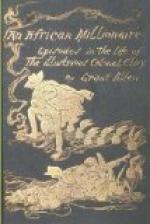As to that point, also, the judge commented on the obvious strength of the police case, and the fact that the prisoner had not attempted in any one out of so many instances to prove an alibi. Surely, if he were not Colonel Clay, the jury should ask themselves, must it not have been simple and easy for him to do so? Finally, the judge summed up all the elements of doubt in the identification—and all the elements of probability; and left it to the jury to draw their own conclusions.
They retired at the end to consider their verdict. While they were absent every eye in court was fixed on the prisoner. But Paul Finglemore himself looked steadily towards the further end of the hall, where two pale-faced women sat together, with handkerchiefs in their hands, and eyes red with weeping.
Only then, as he stood there, awaiting the verdict, with a fixed white face, prepared for everything, did I begin to realise with what courage and pluck that one lone man had sustained so long an unequal contest against wealth, authority, and all the Governments of Europe, aided but by his own skill and two feeble women! Only then did I feel he had played his reckless game through all those years with this ever before him! I found it hard to picture.
The jury filed slowly back. There was dead silence in court as the clerk put the question, “Do you find the prisoner at the bar guilty or not guilty?”
“We find him guilty.”
“On all the counts?”
“On all the counts of the indictment.”
The women at the back burst into tears, unanimously.
Mr. Justice Rhadamanth addressed the prisoner. “Have you anything to urge,” he asked in a very stern tone, “in mitigation of whatever sentence the Court may see fit to pass upon you?”
“Nothing,” the prisoner answered, just faltering slightly. “I have brought it upon myself—but—I have protected the lives of those nearest and dearest to me. I have fought hard for my own hand. I admit my crime, and will face my punishment. I only regret that, since we were both of us rogues—myself and the prosecutor—the lesser rogue should have stood here in the dock, and the greater in the witness-box. Our country takes care to decorate each according to his deserts—to him, the Grand Cross of St. Michael and St. George; to me, the Broad Arrow!”




